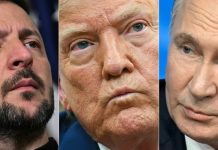Will US-Russia Relations Normalize? President of the United States Donald Trump refused to call Russia a threat to American security, noting that US-Russia relations will eventually normalize. The head of the White House expressed this position on Monday at a joint press conference with the President of Finland Sauli Niinisto in Washington. “I see many countries as a threat to security, unfortunately,” Trump said, not calling Russia. Journalists asked him whether he considers Moscow “a security threat” to the United States.
Pointing to the situation, “which is now emerging around the world,” he said that the US “will be able to cope with all the threats, if necessary.” “I hope we will not have to deal with them but if this happens, we will cope with them,” the American leader said.
He also said that the US is determined to protect its partners and allies in the Baltic. According to Trump, Washington regards the Baltic region as a “very important part” of the world. “We are going to provide significant protection for this region while improving US-Russia relations,” Trump said. “We have wonderful friends there.”
Normalization of US-Russia Relations
The American leader expressed confidence that relations between the United States and Russia will sooner or later normalize. “This is a big country, it’s a nuclear power, this is a country that we need to get along with, and I think that in the end, we will get along with Russia,” he said.
“Russia deeply respects Finland, which is good, I think that Finland has good relations with Russia, and I hope that one day the United States will have a very good relationship with Russia: it will be good for world peace,” – added the American leader.
Last week, the head of the State Department’s press service, Heather Nauerth, recalled that the US administration, led by Trump, from the very beginning of coming to power in January this year signalled that he considered Russian-American relations to be “at a low point.” At the same time, she noted that “it was possible to start moving forward, finding the areas of mutual consent, mutual cooperation.” According to her, one of such areas was the establishment of a “fairly good” cooperation “in a certain part of Syria, in which about five to six weeks ago a cease-fire was announced.”
What is the New US Policy on Global Conflicts?
Expanding US-Russia Relations and Dialogue
Finnish President Sauli Niinistö at the press conference said the need for increased dialogue between Russia and NATO in order to avoid conflicts, especially in light of the large-scale exercises and movement of military equipment in the Baltic region. “We should be very careful that large-scale exercises, large-scale military movements do not provoke any accidental problems because we understand that incidents can develop into anything,” he said.
“In this regard, it is important to continue to work with NATO to expand the dialogue between Russia and NATO,” he said. The leader of Finland also recalled that “at a meeting held about a year ago, all NATO member states declared: with respect to Russia, deterrence must be used, but at the same time it should conduct a dialogue.”
At the same time, Niinisteau, in essence, negatively answered the question of whether Finland could act as an intermediary between Russia and the United States in order to normalize their relations. “Actually, I do not think that I or Finland can be anybody’s advisors,” he said, “but we are doing our best and hope that this will give results.”




